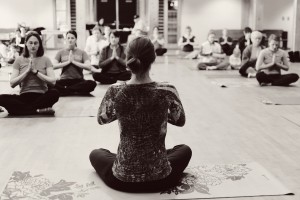
Photo by Ann Richmond.
Generose, a mother of six children living in Congo, had an unexpected visit of about 20 armed men several years ago. These men were part of a rebel group that regularly invade homes to instill fear.
Generose’s experience that night would be far from regular. The men shot her husband, raped her, and cut off her right leg.
Generose’s story of recovery is told by Yoga for Congo Women during its hour-long yoga sessions. Yoga for Congo Women’s goal is to help Congolese women overcome the tragically typical events like Generose’s throughout the Congo. It will be having a yoga session at the Provo library Oct. 25.
Congo’s civil war has been a constant fluctuating conflict of interests since its independence in 1960, when an army mutiny attempted to separate the country.
Today, 7 million people have died in the Congolese conflict that resulted in the Rwandan invasion of the Congolese capital and the resource-rich region in eastern Congo.
“I was 18 or 19 when I began to work and I realized…I didn’t want to live there for the rest of my life,” said Jacqueline Foley, who was born and raised in Congo but left the in 1989, before the Rwandan genocide.
Foley considers herself lucky that she was able to leave before the conflict escalated, but she explained that conditions for women were still bad when she was a girl growing up under a corrupt government.
“Some of them, they think they totally have the right to beat you and to rape you,” Foley said of the men who would employ women in their businesses. “That’s the mindset there, totally.”
Foley was able to work for more respectable employers, a blessing that she attributes to her stubbornness and selective application process. She has a family now in Cedar City and a son at BYU, but she still has family, including her mother, in Congo, and she mourns the ongoing war in her native country.
“My friend and I, we talk and we’re like ‘Why is nobody saying anything? Why does nobody in this world care?'” Foley said.
BYU graduate Ann Richmond founded the organization “Yoga for Congo Women” in order to tell the story of the Congo civil war and help the women who still live there. The organization holds free yoga sessions that allow people to become educated on the conflict and to donate money to the cause, which helps sponsor Congolese women through their program.
“I really feel like there is a difference that is being made and can be made,” Richmond said of the organization’s successes. “These women feel like they still have worth and they still have value.”
Yoga for Congo Women has sponsored 20 women so far. Sponsored women enter a program to receive counseling and psychiatric care to combat their traumatic pasts, become trained in a trade or craft like soap-making, and are given a lump sum of money to help them start their own business and practice their skills.
The program is managed by Women for Women International, which has sponsored 60,000 women in Congo. U.S. foreign policy and international debt relief has also helped ameliorate the conflict in Congo, but many believe it is still a long process.
“It seems like when they make one step, another three steps back would happen,” said Richmond. The constant influx of rebels who want to control the nation’s resources have prolonged the suffering of women and children in Congo.
Richmond said that rebels in Congo are so brutal to the family institution because they recognize it as the most important unit for a cohesive and strong society. Rebels destroy families and instill fear as a method to keep the Congolese people passively afraid to defend themselves.
Generose overcame her oppressive past and is now a business-owner, thanks in part to the Women for Women program and its auxiliary organizations.
“You can succeed, you just have to make your choice and you have to try hard,” Foley said.




